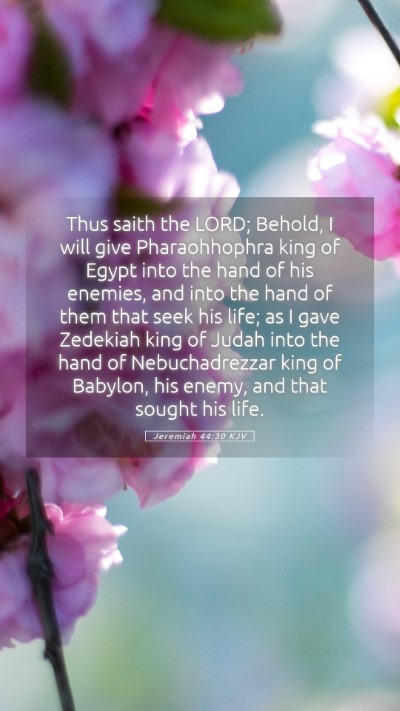Understanding Jeremiah 44:30
In this exegesis, we explore Jeremiah 44:30, bridging insights from esteemed public domain commentaries like those of Matthew Henry, Albert Barnes, and Adam Clarke. This verse holds significant meaning within the context of Biblical prophecy and the responses of the people of Judah during a critical period.
Verse Overview
Jeremiah 44:30: “Thus says the Lord, Behold, I will give Pharaoh Hophra king of Egypt into the hand of his enemies, and into the hand of them that seek his life, as I gave Zedekiah king of Judah into the hand of Nebuchadnezzar king of Babylon, his enemy, and that sought his life.”
Contextual Background
This prophecy was given during a time when the Jewish people were in Egypt, having fled there after the destruction of Jerusalem. The Israelites continued to worship pagan idols, ignoring Jeremiah’s prophecies. This disobedience led to significant prophecies of judgment against both Egypt and the remnants of Judah.
Interpretation and Analysis
The verse serves as a warning, reflecting God’s sovereignty and judgment. Several commentaries provide insights into its deeper meanings:
-
Matthew Henry's Commentary:
Henry emphasizes God's sovereignty over nations and kings. Pharaoh Hophra is depicted not just as an earthly ruler, but as a pawn in God’s divine plan. His downfall symbolizes the inevitable consequence of rebellion against God's will.
-
Albert Barnes’ Notes:
Barnes highlights the parallel between the fates of Hophra and Zedekiah. Both rulers, despite their might, faced judgment due to their actions and choices. This illustrates a key Biblical principle: rulers are also accountable to God.
-
Adam Clarke’s Commentary:
Clarke comments on the historical implications of this prophecy. He provides context on Pharaoh Hophra’s reign and his eventual demise. The prophetic declaration assures that God’s word will come to pass, further stressing the importance of obedience and faithfulness to God.
Theological Significance
This verse teaches crucial lessons about:
- The Lord's Sovereignty: God orchestrates the events of history and the outcomes of nations.
- Accountability of Leaders: Rulers, like the common people, are responsible for their decisions before God.
- Judgment for Idolatry: The Israelites' continued idolatry and disobedience led them out of God's favor, serving as a warning for all believers.
Application for Today
For contemporary readers, Jeremiah 44:30 serves as a challenge to reflect on our own obedience and relationship with God. Understanding this scripture can inform personal Bible study through:
- Self-Reflection: Examine areas of life where disobedience may manifest.
- Group Study: Discuss the relevance of God’s sovereignty in modern leadership within Bible study groups.
- Prayer for Guidance: Seek God's direction in decision-making processes.
Cross References
This passage relates to several other scriptures that reinforce its themes:
- 2 Kings 25:1-7: The fall of Zedekiah.
- Jeremiah 37:1-10: Further prophecies about Zedekiah and the consequences of rebellion.
- Ezekiel 30:1-10: Prophecies concerning Egypt and its rulers.
- Proverbs 21:1: “The king's heart is in the hand of the Lord…” illustrating God’s control over rulers.
- Isaiah 19:1-4: Prophetic oracles concerning Egypt.
Conclusion
In conclusion, Jeremiah 44:30 serves not only as a historical account but also as a profound lesson on the importance of obedience to God. Through careful analysis and commentary reflection, one can gain a deeper understanding of Scripture and its application for today's believers. This scripture, along with others, provides rich material for Bible study insights, promoting reflection, discussion, and growth among individuals and Bible study groups alike.


